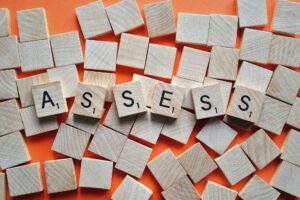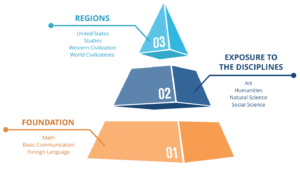Fall 2020 General Education Forum Presents New Assessment Model

On Wednesday, October 28, 2020, the General Education (GE) Board held its Fall GE Forum. GE Board officers gave a short presentation on the new GE assessment model and its implementation in AY 2019-2020. The new model conducts assessment of GE categories in capstone courses or equivalents to provide data on students’ performances in GE over their entire education, rather than just a snapshot, as in the former model. GE Board officers presented findings from the assessment of student achievement in the Humanities, Social Sciences, Natural Sciences, and Western Civilization GE categories. Lastly, forum attendees discussed the assessment findings and how the GE Board might assess GE categories that are up for assessment in AY 2020-2021. These categories are World Civilizations, United States Studies, and Basic Communication (Oral).
The General Education Board implemented the new process for assessment based on the capstone plan established during the 2019-2020 school year. The new model was approved by faculty at the April 3, 2019, meeting of the Faculty Senate. Following are answers to frequently asked questions about the new assessment process.
Why did we change GE assessment? The previous model of GE assessment required instructors teaching GE classes to evaluate how many students in their classes met the student learning outcomes for that GE category using an assignment from the class. Since students typically take GE courses in their first two years, the GE Board gathered data from the beginning of students’ education. The new capstone model of assessment has students in capstone or similar level classes submit an essay in response to prompts that are developed by a group of faculty members who teach in that GE category. The student work evaluated is not taken directly from GE courses, and the data collected is near the end of the student’s education at New Paltz rather than the beginning. This new process allows the evaluation of student learning outcomes across the student’s entire education, rather than gaining a snapshot of it. Since GE assessment aims to measure student learning at the university level and not in individual classes, this new model provides better data for use by faculty and the College. This new model also encourages more discussion and collaboration across disciplines. Teams of faculty volunteers who teach in GE develop the prompts for GE assessment and evaluate the student’s work to determine if it meets student learning outcomes. Additionally, students are now more directly involved in GE assessment, whereas they were mostly unaware of it before. The capstone assessment invites students to reflect on their education at New Paltz.
What were the results? The results of the spring 2020 assessment of Humanities, Western Civilizations, Social Sciences, and Natural Sciences can be found in Associate Provost Laurel M. Garrick Duhaney’s 2019-2020 Assessment of Student Learning Outcomes in General Education Summary Report. The percentage of students meeting student learning outcomes for each GE category were lower than previous assessments, but these numbers are largely due to the new process. The previous process assessed graded assignments taken directly from a GE course by faculty teaching that course, whereas the new process assesses ungraded work gathered only for the purpose of assessing student learning in GE. Some students expressed confusion and wrote essays of protest or letters of praise for their professors, which means their essays were automatically counted as not meeting student learning outcomes for those categories. The assessment team for Natural Sciences gave each essay an effort score to filter out essays that had no substance, which could be applied to other subject areas. We are still learning how to implement this model of assessment effectively and interpret the results in meaningful ways.
How should we respond to these results? The GE board polled faculty members who proctored the assessment in their capstone classes and/or who participated in developing prompts and assessing student work and received many excellent suggestions for how to improve the assessment process. Our main goals for assessment this year are to revise the assessment process to be clearer and more accessible for students, especially those with disability or impairments, and to build communication about GE assessment and its purpose. Improved communication will mitigate surprise when students are asked to participate in GE assessment in their capstone classes and invite more student input in the process.
To learn more about the new GE assessment model, download the PowerPoint to the GE Board presentation from the Strategic Planning and Assessment website at https://www.newpaltz.edu/spa/general-education/ge-2020-fall-forum-powerpoint/.
Board of Trustees
General Education Categories and Competencies

Knowledge and Skill Areas
MATHEMATICS
Students will demonstrate the ability to:
- interpret and draw inferences from mathematical models such as formulas, graphs, tables and schematics;
- represent mathematical information symbolically, visually, numerically and verbally;
- employ quantitative methods such as, arithmetic, algebra, geometry, or statistics to solve problems;
- estimate and check mathematical results for reasonableness; and
- recognize the limits of mathematical and statistical methods.
NATURAL SCIENCES
Students will demonstrate:
- understanding of the methods scientists use to explore natural phenomena, including observation, hypothesis development, measurement and data collection, experimentation, evaluation of evidence, and employment of mathematical analysis; and
- application of scientific data, concepts, and models in one of the natural (or physical) sciences.
SOCIAL SCIENCES
Students will demonstrate:
- understanding of the methods social scientists use to explore social phenomena, including observation, hypothesis development, measurement and data collection, experimentation, evaluation of evidence, and employment of mathematical and interpretive analysis; and
- knowledge of major concepts, models and issues of at least one discipline in the social sciences.
AMERICAN HISTORY
Students will demonstrate:
- knowledge of a basic narrative of American history: political, economic, social, and cultural, including knowledge of unity and diversity in American society;
- knowledge of common institutions in American society and how they have affected different groups; and
- understanding of America’s evolving relationship with the rest of the world.
WESTERN CIVILIZATION
Students will:
- demonstrate knowledge of the development of the distinctive features of the history, institutions, economy, society, culture, etc., of Western civilization; and
- relate the development of Western civilization to that of other regions of the world.
WORLD CIVILIZATIONS
Students will demonstrate:
- knowledge of either a broad outline of world history, or
- the distinctive features of the history, institutions, economy, society, culture, etc., of one non- Western civilization.
HUMANITIES
Students will demonstrate:
- knowledge of the conventions and methods of at least one of the humanities in addition to those encompassed by other knowledge areas required by the General Education program.
THE ARTS
Students will demonstrate:
- understanding of at least one principal form of artistic expression and the creative process inherent therein.
FOREIGN LANGUAGE
Students will demonstrate:
- basic proficiency in the understanding and use of a foreign language; and
- knowledge of the distinctive features of culture(s) associated with the language they are studying.
BASIC COMMUMICATION
Students will:
- produce coherent texts within common college-level written forms;
- demonstrate the ability to revise and improve such texts;
- research a topic, develop an argument, and organize supporting details;
- develop proficiency in oral discourse; and
- evaluate an oral presentation according to established criteria.
Competencies
The following two competencies should be infused throughout the General Education program:
CRITICAL THINKING (REASONING)
Students will:
- identify, analyze, and evaluate arguments as they occur in their own or others’ work; and
- develop well-reasoned arguments.
INFORMATION MANAGEMENT
Students will:
- perform the basic operations of personal computer use;
- understand and use basic research techniques; and
- locate, evaluate and synthesize information from a variety of sources.
